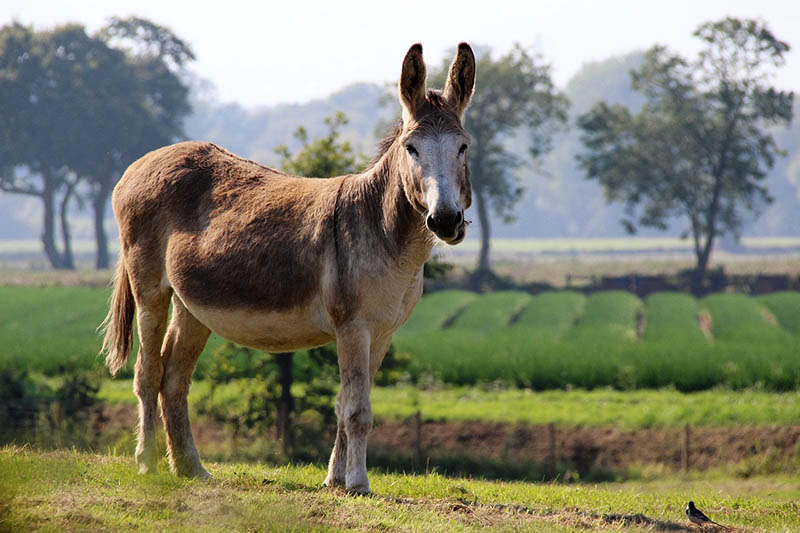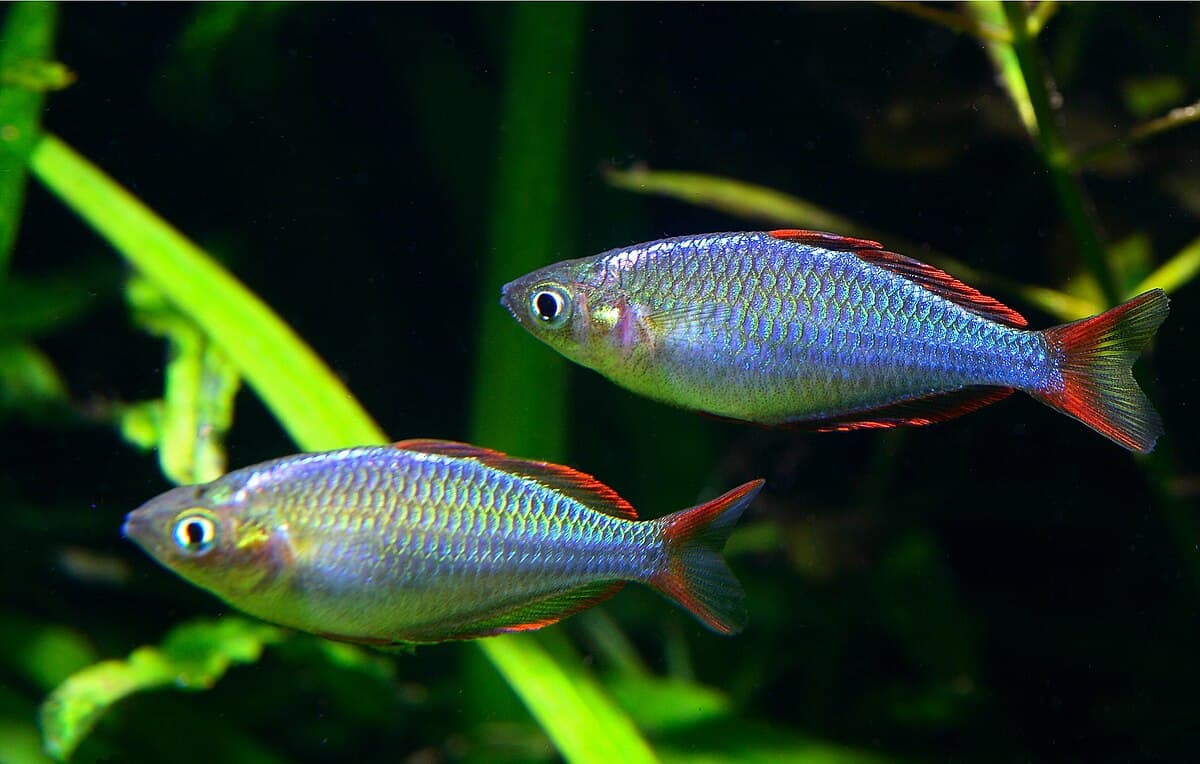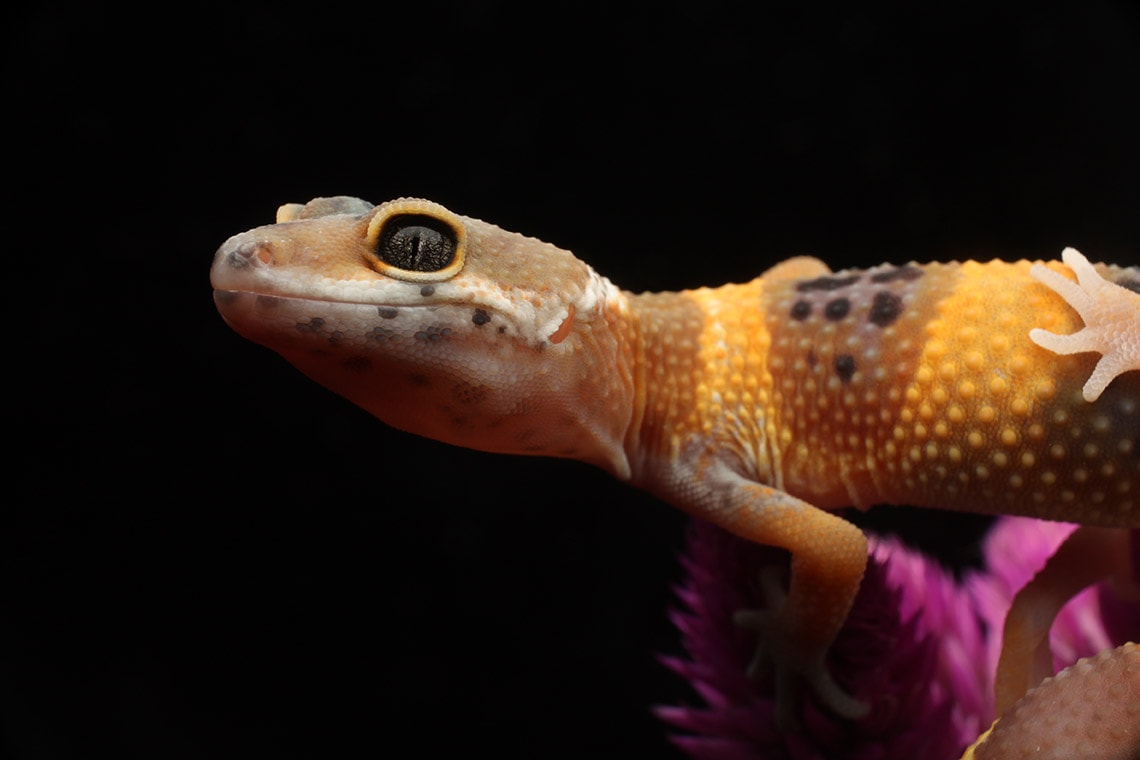Click to Skip Ahead
Standard donkeys are a type and size classification of donkey. Though there are over 40 million donkeys in the world, the number of purebred individuals for the breed is low. Most donkeys are mixed breeds, but breed associations, like the American Donkey and Mule Society,1 allow donkeys to be registered by size. Standard donkeys are the mid-range size classification between miniature and large or mammoth donkeys.
Breed Overview
Height:
36–48 inches (small), 48–54 inches (large)
Weight:
400–500 pounds
Lifespan:
27–40 years
Colors:
Gray, brown, black, roan, pure white, combination
Suitable for:
Farms, homesteads
Temperament:
Stubborn, fiercely protective, brave, sociable
Standard Donkey Characteristics

Standard Donkey Foals
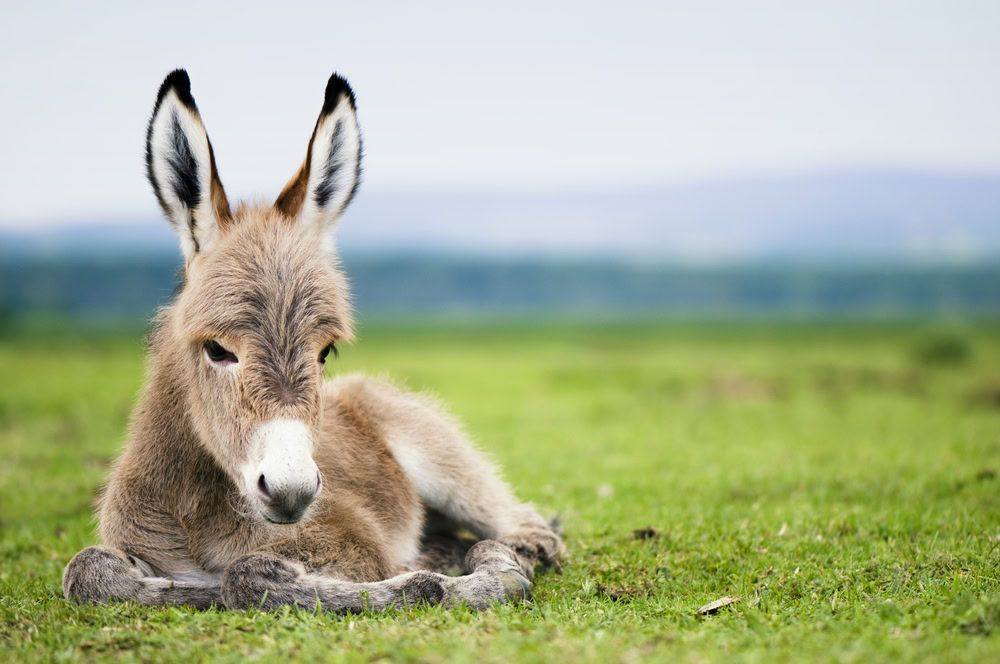
Like horses, donkey owners typically acquire an older animal ready for training or already trained, though foals may be available. Training a donkey is not like a puppy or kitten, however, and requires some experience to manage. Because of this, some people prefer to go through a rescue to get an adult donkey that’s already started.
Health concerns are also different with donkeys. Any donkey for sale should be checked by a vet for serviceable soundness and general health.2 Otherwise, the donkey may have an expensive medical condition that may limit or prevent it from performing work.

Temperament & Intelligence of the Standard Donkey
Wondering if a donkey is the right choice for your homestead? Here’s what you need to know.
Are These Donkeys Good for Families? 👪
Donkeys are work animals, not pets. Though they can be sweet and gentle, they’re intended for farm work like riding or carrying packs. A standard donkey, in particular, is too large to keep in the home and prefers to be part of a pack of other animals. Donkeys also do best when they have a job to do rather than acting as a pasture companion for other animals.
Does This Breed Get Along With Other Pets?
Donkeys usually get along well with other livestock and tend to take on the personality of the farm. They do best with other donkeys as part of a herd, but they can bond with horses, sheep, goats, or cattle. Some donkeys will get territorial with other small livestock, however, such as sheep, llamas, or goats. Donkeys may get along with dogs, but as prey animals, they could perceive a dog as a threat and become defensive or territorial.
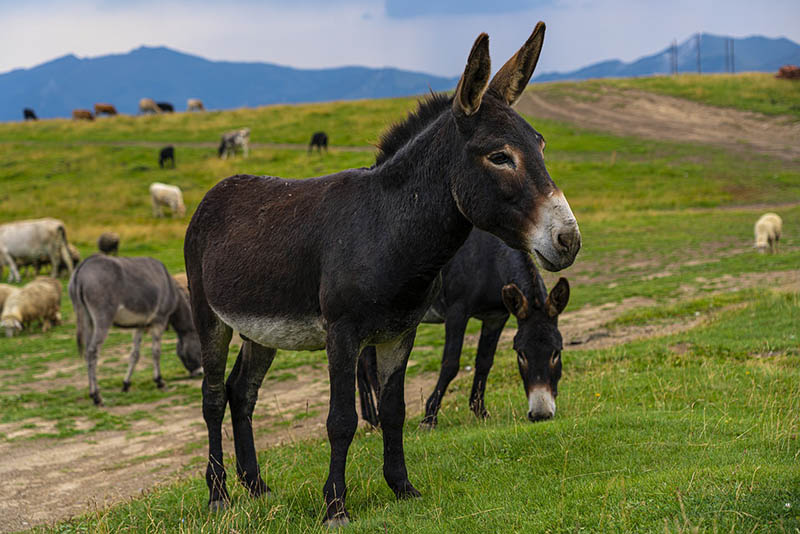

Things to Know When Owning a Standard Donkey:
Donkeys may be smaller and easier than horses or cattle, but they still have needs. Here’s what you can expect when you bring a standard donkey home.
Food & Diet Requirements
Donkeys eat a lot of plant fiber and need a mix of hay and pasture. Donkeys can have hay and supplements, but it’s important to get food that’s appropriate for donkeys and not horses—not all ingredients are safe. These animals are small, but they’re hardy and eat a lot of food in bulk each day.
Exercise
Donkeys need daily exercise to stay healthy and happy. It’s especially important to maintain their body weight since they’re prone to obesity from overfeeding with too little exercise. If given space, donkeys will get some exercise on their own. It’s also crucial to exercise your donkey regularly to maintain your bond and training and ensure that behavioral issues don’t develop.
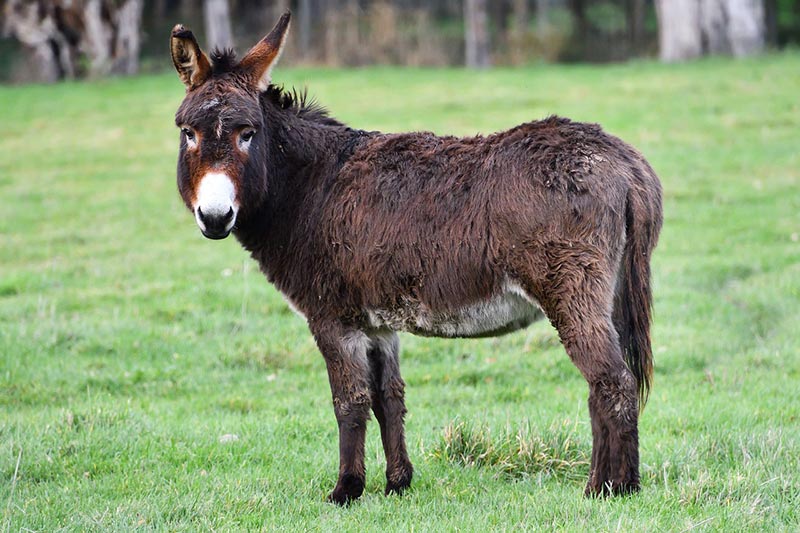
Training
Though donkeys can have a stubborn streak, they’re intelligent animals and take well to training. They’re good under saddle and with pulling or hauling, and they learn ground manners very easily. Donkeys respond best to consistency and patience rather than rough handling and punishment. If you’re not prepared to start a donkey, consider getting an older donkey or rescue that has basic ground manners. You could also work with a trainer with experience training donkeys.
Grooming
Donkeys require regular hoof trimming every 6-8 weeks, dental floating at least once a year, and regular grooming. They should be brushed several times a week, if not daily, and their hooves need to be picked out and conditioned. In warm months, donkeys should be bathed every few weeks, and less often when the weather gets cold. Donkeys will shed several times a year.
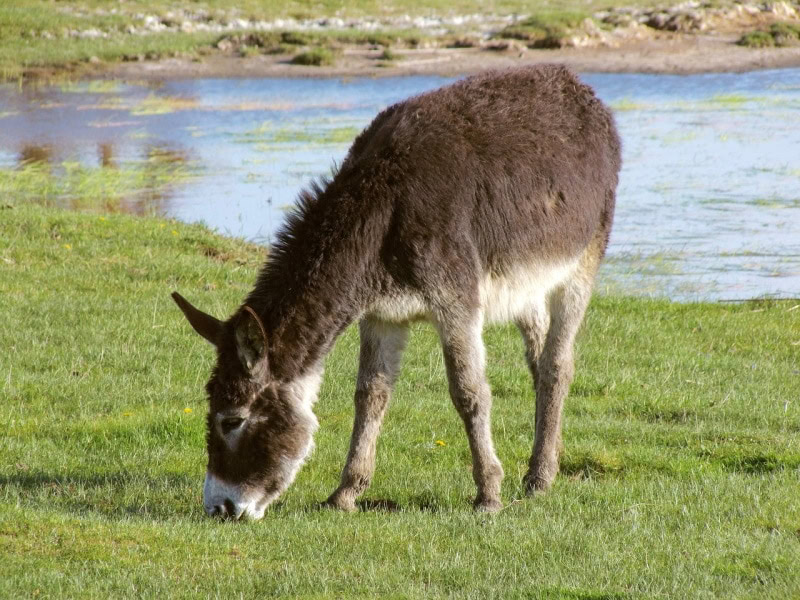
Health & Conditions
Donkeys are hardy, but they need regular veterinary care like any other animal. Domestic donkeys need vaccines for tetanus, flu, and distemper yearly. They may need other vaccines, depending on the local disease risks. Donkeys can acquire several of the same conditions as horses, as well as some unique to the species. The best way to keep a donkey healthy is with regular veterinary checkups to identify problems when they’re minor.
- Insect hypersensitivity
- Dermatitis
- Cataracts
- Hoof abscesses
- Thrush
- Diarrhea
- Gastric ulcers
- Equine infectious anemia
- Colic
- Internal parasites
- Equine metabolic syndrome
- Cushing’s disease
- Laminitis
- White line disease
- Equine encephalomyelitis
- Tetanus
- West Nile virus
- Rabies
- Strangles
- Lungworms
- Brucellosis

Male vs Female
Both male and female donkeys have individual personalities that may be more suitable for your farm. Jacks should be gelded, or castrated, to avoid behavioral issues like excessive aggression or territoriality. Jennies are rarely spayed, as this surgery is expensive and risky. If a jenny has problems as a result of heat cycles, either behaviorally or in terms of pain, hormone medications can curb the symptoms with less risk and expense than spaying.


3 Little-Known Facts About the Standard Donkey
1. Male Donkeys Are Jacks & Females Are Jennies
Male donkeys are called jacks, and females are called jennies or jennets, though the latter is usually used with miniature donkeys. A jack that mates with a female horse (mare) will produce a mule, while a jenny and a male horse (stallion) will produce a hinny. Hybrids are usually sterile and can’t produce offspring of their own.
2. Donkeys Are Good Livestock Guardians
Donkeys and horses belong to the same family, but many donkeys evolved in mountainous areas and rocky highlands. Flight is not a practical response to threats, so these animals became fierce fighters.3 That bravery and protective instinct make them excellent livestock guardians to protect the herd from coyotes or wolves. Not all donkeys are equally territorial, however.
3. Wild Asses Are Critically Endangered, While Feral Burros Are Invasive
Domestic donkeys are stable populations, but the African wild ass is critically endangered,4 with only a few hundred adults left. Asiatic wild asses are near threatened, with a population of around 28,000. Conversely, feral burros introduced to the US—descendants of the wild ass—are an invasive species in parts of the US and compete with native animals for limited resources.5
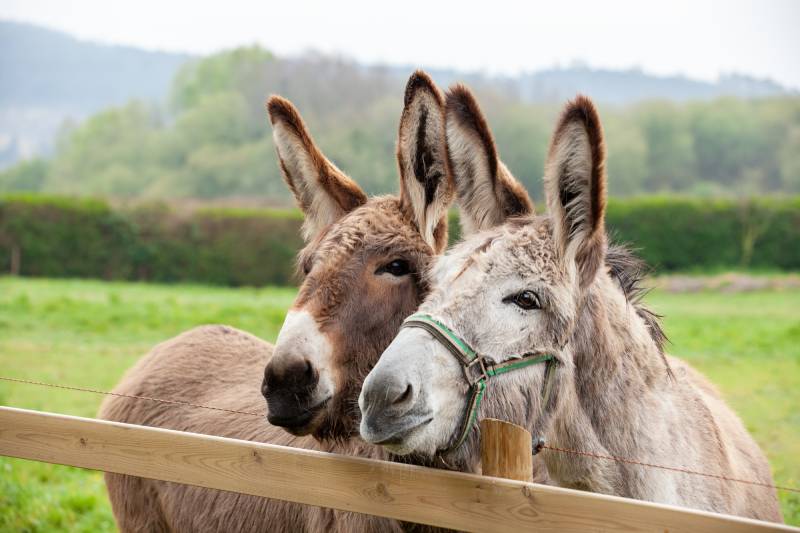

Conclusion
Standard donkeys are brave, intelligent, and sociable animals that are adaptable to many farm and homestead environments. With the right pasture mates and proper care, donkeys can live long, happy, and productive lives. Because donkeys live for decades, it’s important to consider the commitment of bringing home a donkey and caring for its needs throughout it’s whole lifespan.
- https://en.wikipedia.org/wiki/North_American_donkeys
- http://www.lovelongears.com/about_donkeys2.html
- https://modernfarmer.com/2014/12/donkey-kicks-ass/
- http://www.americandonkeys.com/How_to_Register_My_Donkey.html
- https://www.thedonkeysanctuary.org.uk/what-we-do/knowledge-and-advice/about-donkeys#:~:text=The%20most%20common%20coat%20colour,rarest%20colour%20is%20pure%20white
- https://www.thedonkeysanctuary.org.uk/what-we-do/knowledge-and-advice/about-donkeys
- https://www.thedonkeysanctuary.org.uk/what-we-do/knowledge-and-advice/for-owners/buying-a-donkey
- https://www.livescience.com/54258-donkeys.html
- http://bioweb.uwlax.edu/bio203/s2009/wells_kels/Adapation.htm
- https://www.thedonkeysanctuary.org.uk/sites/uk/files/2017-08/understanding-donkey-behaviour.pdf
- https://www.nps.gov/deva/learn/nature/invasive-burros.htm
- https://www.animalwised.com/donkeys-as-pets-guidelines-and-basic-care-1009.html
- https://opensanctuary.org/common-donkey-health-issues/
- https://www.thedonkeysanctuary.org.uk/what-we-do/knowledge-and-advice/for-owners/stallions-mares-and-geldings
- https://www.petmd.com/blogs/thedailyvet/aobriendvm/2014/august/why-you-dont-spay-when-animal-eats-hay-31930
- https://practicalhorsemanmag.com/health-archive/what-is-serviceably-sound-11664/
Featured Image Credit: Kevin, Pixabay
